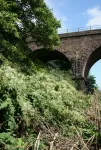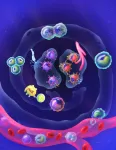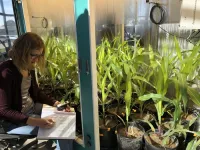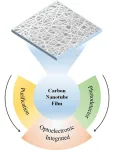(Press-News.org) New Swansea University research has looked at the long-term environmental impact of different methods to control Japanese knotweed.
The invasive species has been calculated to cost more than £165 million to manage every year in the UK alone. Its presence can blight property purchases for households across the country.
This has led to the development of different ways of trying to control it but with sustainability becoming increasingly important, understanding the effect of these management methods is vital.
A new study, led by biosciences lecturer Dr Sophie Hocking and looking at the entire life cycle and long term impacts of different management approaches, has just been published in online journal Scientific Reports.
Dr Hocking said: “In light of the current climate emergency and biodiversity crisis, invasive species management and sustainability have never been so important.
“Both of these are intrinsically linked – we know that invasive species can cause substantial negative ecological, social and economic impacts, and the way we manage these species should mitigate against this in a sustainable way to ensure we are not doing more harm than good.
“Although there has been more research into how we can best manage the plant, little is known about how sustainable these approaches are.”
This study follows on from previous research which has put Swansea University at the forefront of Japanese knotweed expertise and understanding.
Back in 2012 Professor Dan Eastwood and Dr Dan Jones launched the world’s largest knotweed control field trial which tested the main physical, chemical and integrated methods of controlling the species. The research has been undertaken in close partnership with Complete Weed Control’s Managing Director Ian Graham and Advanced Invasives, a spinout company, headed by Dr Jones.
This field study provided valuable information for Dr Hocking’s work. Using a life cycle assessment (LCA) - a methodology for assessing environmental impacts associated with all the stages of the life cycle of a commercial process – to find out the relative environmental impacts of a range of chemical and physiochemical knotweed management methods.
The researchers went beyond a focus on the use and end-of life if these methods and assessed the environmental impacts of different management methods including the production of materials and herbicides required to achieve knotweed control; something that is often overlooked when we evaluate sustainability. For the study, the team selected methods commonly used for knotweed management and used real-world data on time consumption, amount of materials used and economic costs to evaluate their relative environmental impacts.
Of the methods tested, they found that the simplest approach - glyphosate-based foliar spray control methods - used the least materials, had the lowest environmental impacts, the lowest economic costs and is, therefore, the most sustainable approach to tackle knotweed management. The findings are of significance to those working with or are affected by the presence of Japanese knotweed on their land
Dr Hocking added: “Currently there is a big conversation around the sustainability of herbicides and the ecological and human-health impacts of this. Social perceptions of the ways we manage invasive plants are really important, but we need our understanding of sustainability to be rooted in empirical evidence.
“We hope that this research will contribute to our wider understanding of the sustainability of different approaches in invasive plant management and help to inform current knotweed management practice.”
END
New study counts the environmental cost of managing Japanese knotweed
Swansea University research has looked at the long-term environmental impact of different methods to control Japanese knotweed.
2023-03-17
ELSE PRESS RELEASES FROM THIS DATE:
Discovery of an unexpected function of blood immune cells : Their ability to proliferate !
2023-03-17
The ability of a cell to divide, to proliferate, is essential for life and gives rise to the formation of complex organisms from a single cell. It also allows the replacement of used cells from a limited number of “stem” cells, which then proliferate and specialize. In cancer, however, cell proliferation is no longer controlled and becomes chaotic. Researchers from the GIGA Institute at the University of Liège have discovered that, in a healthy individual, certain blood immune cells, the monocytes, ...
Women working rotating shifts especially likely to be frail, York study finds
2023-03-17
March 17, 2023, TORONTO — A new study led by researchers at York University has found a link between shift work and frailty among middle-aged and older workers in Canada, especially for women on rotating shifts.
While there is a large body of research suggesting the disruptions to circadian rhythms that shift workers experience are linked to various illnesses, this study was the first to take a comprehensive or “holistic” look at the connection between shift work and frailty.
“We cannot ignore the negative health outcomes related to shift work, including cardiovascular diseases, ...
Argonne hosts conference for undergraduate women in physics
2023-03-17
The U.S. Department of Energy’s (DOE) Argonne National Laboratory hosted an American Physical Society (APS) Conference for Undergraduate Women in Physics (CUWiP) on Jan. 20-22. The conference series, sponsored by DOE and the National Science Foundation, is designed to support undergraduate women and gender minorities in physics by connecting them with resources, community, information on graduate school and professionals in their field. It also provides students with access to other women in physics with whom they can share experiences, advice and ideas.
The January 2023 event is one of 14 APS CUWiP events hosted across the country and ...
How can we tackle the biggest challenges? Ask a plant
2023-03-17
LOS ALAMOS, N.M., March 16, 2023 — Without plants, we’d have no air to breathe or food to eat, yet plant science lingers in the shadowy wings while other fields take center stage. With the goal of shining the spotlight on plants, a new study presents the field’s top 100 most pressing questions for research to address the greatest challenges facing humanity.
“The study highlights the importance of plant science for society by laying out myriad questions and technical challenges ...
Genes shed light on why men and women experience different depression symptoms
2023-03-17
Depression is widely reported to be more common in women than in men, with women twice as likely to receive a diagnosis than men. A new sex-specific study from McGill University has found that there are differences between male and female genes and how they relate to depression. In a study of more than 270,000 individuals, the researchers found that sex-specific prediction methods were more accurate in forecasting an individual’s genetic risk of developing depression than prediction methods that did not specify sex. The researchers found ...
Breaking barriers in hepatitis C diagnosis and treatment for populations at risk
2023-03-17
A study with people who inject drugs evaluated a minimally invasive test based on dried blood spots (DBS) for the monitoring of hepatitis C virus (HCV) infection. The use of DBS samples for HCV RNA detection and genotyping was shown to effectively assess cure after treatment and to differentiate between reinfection and treatment failure. The results support the viability of decentralizing treatment and post-treatment monitoring for people who inject drugs, who frequently face challenges accessing the healthcare system. The study, which has been published in the Journal of Medical Virology, was carried out as part of a project with support from the "Conquering ...
UMass Amherst providing 30 three-year scholarships to boost diversity in mathematics and statistics
2023-03-17
AMHERST, Mass. – University of Massachusetts Amherst’s Department of Mathematics and Statistics is offering 30 three-year scholarships to a diverse cohort of students majoring in mathematics and statistics, thanks to a $1.5 million dollar grant from the National Science Foundation (NSF).
The six-year project, called Enhancing Underrepresented Participation in Mathematics & Statistics: Mentoring from Junior to Master’s, will welcome its first cohort in the Fall of 2023, and will support each student for their junior and senior years, as well as through a one-year master’s program. The program will accept ...
Carbon nanotube films as ultrasensitive photodetectors: progress and challenges
2023-03-17
Semiconducting single-walled carbon nanotubes (s-SWCNTs) are being used to develop a third generation of optimized shortwave infrared photodetectors that will improve pixel size, weight, power consumption, performance and cost over photodetectors made from traditional materials.
Ultrasensitive shortwave infrared photodetectors, which detect a subset of shortwave infrared light wavelengths outside of the visual spectrum, have many potential applications, including night surveillance, navigation during poor weather conditions, fiber optic communications and semiconductor quality control. Shortwave ...
Mountain forests are being lost at an accelerating rate, putting biodiversity at risk
2023-03-17
More than 85% of the world’s bird, mammal, and amphibian species live in mountains, particularly in forest habitats, but researchers report in the journal One Earth on March 17 that these forests are disappearing at an accelerating rate. Globally, we have lost 78.1 million hectares (7.1%) of mountain forest since 2000—an area larger than the size of Texas. Much of the loss occurred in tropical biodiversity hotspots, putting increasing pressure on threatened species.
Though their rugged location once protected mountain forests from deforestation, they have been increasingly exploited since the turn of ...
River deltas: Valuable and under threat
2023-03-17
The livelihoods of millions of people who live in river deltas, among the world’s most productive lands, are at risk. Created where large rivers meet the ocean and deposit their natural sediment load, river deltas are often just a few meters above sea level. And while they make up less than 0.5 % of the world’s land area, river deltas contribute more than 4 % of the global GDP, 3% of global crop production, and are home to 5.5 % of the world’s population. All of these values are highly vulnerable to imminent global environmental change, according to a new Stanford University-led study.
“It is often not rising seas, but sinking land due to human activities that ...
LAST 30 PRESS RELEASES:
Scientists identify smooth regional trends in fruit fly survival strategies
Antipathy toward snakes? Your parents likely talked you into that at an early age
Sylvester Cancer Tip Sheet for Feb. 2026
Online exposure to medical misinformation concentrated among older adults
Telehealth improves access to genetic services for adult survivors of childhood cancers
Outdated mortality benchmarks risk missing early signs of famine and delay recognizing mass starvation
Newly discovered bacterium converts carbon dioxide into chemicals using electricity
Flipping and reversing mini-proteins could improve disease treatment
Scientists reveal major hidden source of atmospheric nitrogen pollution in fragile lake basin
Biochar emerges as a powerful tool for soil carbon neutrality and climate mitigation
Tiny cell messengers show big promise for safer protein and gene delivery
AMS releases statement regarding the decision to rescind EPA’s 2009 Endangerment Finding
Parents’ alcohol and drug use influences their children’s consumption, research shows
Modular assembly of chiral nitrogen-bridged rings achieved by palladium-catalyzed diastereoselective and enantioselective cascade cyclization reactions
Promoting civic engagement
AMS Science Preview: Hurricane slowdown, school snow days
Deforestation in the Amazon raises the surface temperature by 3 °C during the dry season
Model more accurately maps the impact of frost on corn crops
How did humans develop sharp vision? Lab-grown retinas show likely answer
Sour grapes? Taste, experience of sour foods depends on individual consumer
At AAAS, professor Krystal Tsosie argues the future of science must be Indigenous-led
From the lab to the living room: Decoding Parkinson’s patients movements in the real world
Research advances in porous materials, as highlighted in the 2025 Nobel Prize in Chemistry
Sally C. Morton, executive vice president of ASU Knowledge Enterprise, presents a bold and practical framework for moving research from discovery to real-world impact
Biochemical parameters in patients with diabetic nephropathy versus individuals with diabetes alone, non-diabetic nephropathy, and healthy controls
Muscular strength and mortality in women ages 63 to 99
Adolescent and young adult requests for medication abortion through online telemedicine
Researchers want a better whiff of plant-based proteins
Pioneering a new generation of lithium battery cathode materials
A Pitt-Johnstown professor found syntax in the warbling duets of wild parrots
[Press-News.org] New study counts the environmental cost of managing Japanese knotweedSwansea University research has looked at the long-term environmental impact of different methods to control Japanese knotweed.








